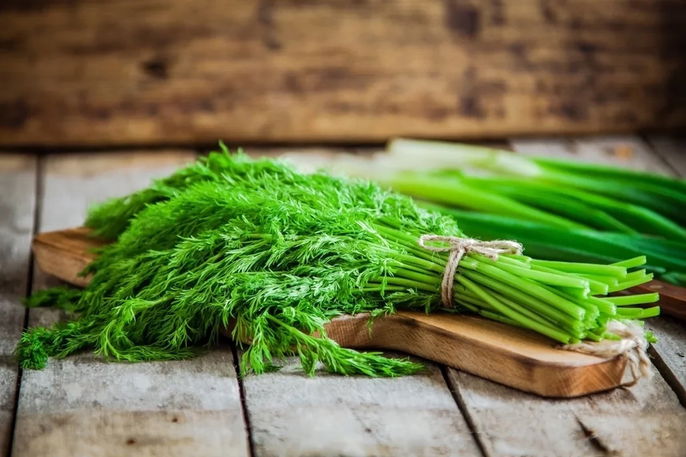Dill is an aromatic herb with medicinal properties that can be used to treat many health conditions, like the flu, the common cold and nasal congestion.
Dill can also be used to relieve digestive symptoms, such as nausea and gas in adults or colic in babies, as well as reduce period-related symptoms.
The scientific name of dill is Aneethun graveolens and the most commonly used parts of this plant are the leaves and seeds. These can be purchased in health food stores, grocery stores and some pharmacies.

Health benefits
Due to its properties, dill contains many health benefits and can be used for medicinal purposes, such as:
1. Improving digestion
Dill is great for digestion, as it helps reduce cramps, gas, nausea, diarrhea and constipation. It can also be used to stimulate the baby's appetite and relieve colic.
2. Promoting mental health
Dill helps relieve fatigue caused by sleep disturbances, as well as increase concentration and memory. Furthermore, dill is a relaxing herb and can be used to treat insomnia and digestive disorders caused by stress.
3. Relieving coughs
Dill has antispasmodic and expectorant properties and therefore, can also be used to treat dry and productive coughs. It can also be used to complement treatment for asthma.
4. Reducing pain
The volatile oils present in both dill leaves and seeds relax smooth muscles, and therefore can be beneficial for relieving muscular tension and pain.
Dill also has analgesic and anti-inflammatory properties that help relieve swelling, arthritis and ear pain.
5. Improving immunity
Some studies indicate that dill also has antibacterial and antifungal properties that are effective against the fungus Candida sp. Furthermore, it has also been proven that dill can inhibit the formation of malignant tumors.
6. Treading fluid retention
Dill is beneficial for the urinary tract system because it contains diuretic properties, It naturally increases the amount of urine eliminated, which can help to prevent fluid retention and reduce inflammation, swelling or heaviness.
Also recommended: 14 Natural Diuretic Teas for Fluid Retention tuasaude.com/en/natural-diuretics7. Regulating menstruation
Dill can also be used to treat painful periods, as it helps regulate menstruation. In addition, it is a plant that is culturally used by women before giving birth, to facilitate the birth of the baby. Dill can also increase milk supply in mothers who are breastfeeding.
8. Maintaining heart health
Dill may help to reduce triglycerides and total and LDL cholesterol levels, as it is rich in flavonoids, tannins and terpenes. These are compounds with antioxidant properties that can prevent heart diseases, such as stroke, atherosclerosis and heart attack.
Nutritional information
The following table outlines the nutritional composition of 100 grams of fresh dill:
How to consume
Dill can be used in various dishes by chopping the leaves and adding it as a seasoning for fish, vegetables or sauces.
The seeds can also be used, whole or ground, and sprinkled over bread dough or mixed into a salad.
Healthy dill recipes
Check-out some healthy recipes to increase your dill intake:
1. Dill tea
Dill tea is the main way to consume this aromatic herb and can be easily prepared at home.
Ingredients
- 1 tablespoon of dill leaves and seeds
- 1 cup of boiling water
Directions
Place 1 tablespoon of dill leaves and seeds in a cup of boiling water. Let it infuse for 15 minutes, then strain and drink afterwards.
2. Pesto sauce with dill
Ingredients
- 30 grams of fresh dill
- 1 clove of garlic
- 30 grams of roasted almonds
- 30 grams of parmesan
- 150 mL of olive oil
- Salt
Directions
Cut the dill and place it in a container to grind together with the garlic using a pestle. Then add the almonds, grated Parmesan cheese, olive oil and salt and grind with a pestle until you obtain a paste.






























